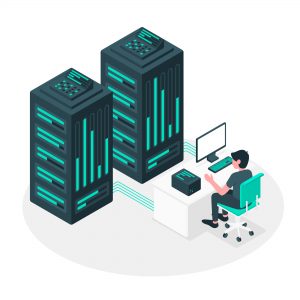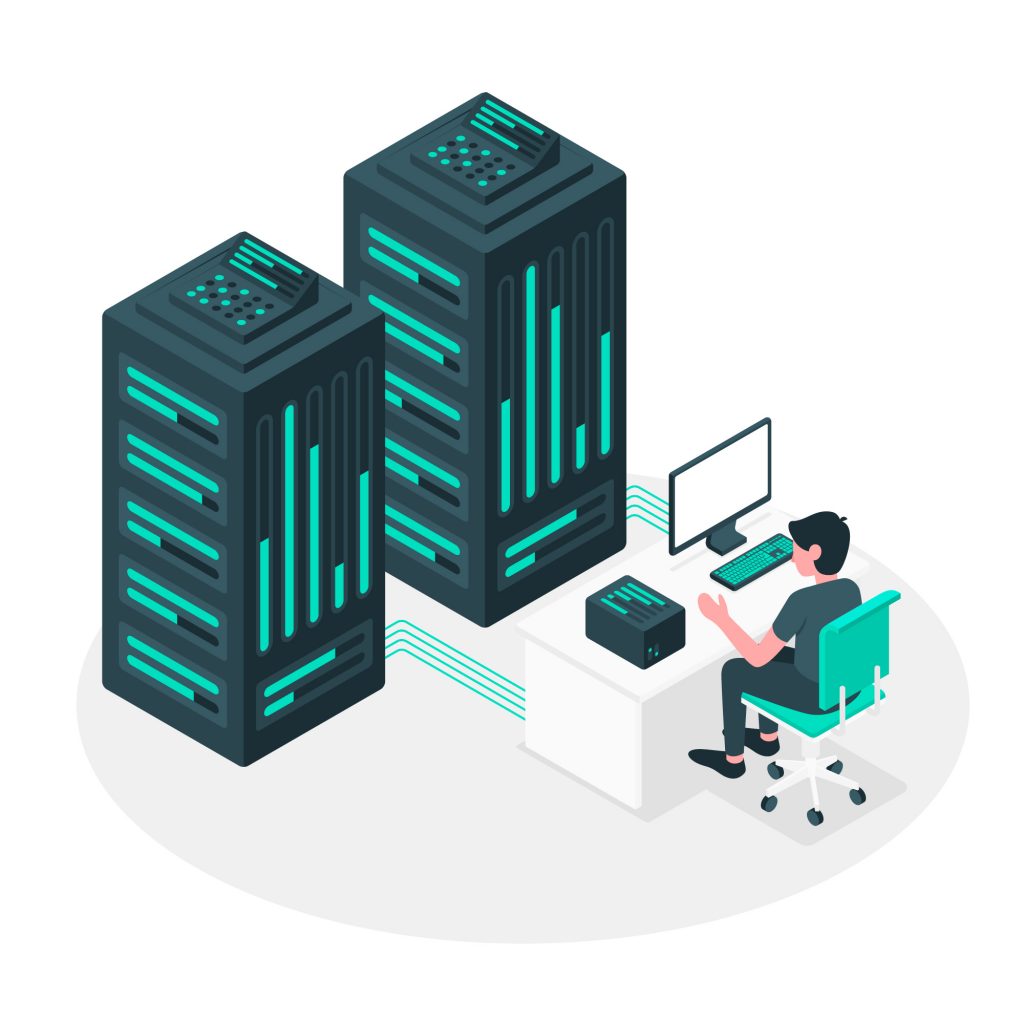Physical Servers vs. Virtual Servers: Key Benefits
Meta Title: Comparing Benefits – Virtual Servers vs Physical Servers
Meta Description: Discover the differences between virtual servers and physical servers. Find out which option offers the best benefits for your organization’s IT infrastructure.
The server market is booming, mainly due to the growing need for data processing and storage fueled by digital services and technologies. Thus, cloud computing giants are expanding their data centers to meet the rising demand.
Grand View Research report suggests that the global server market hit $94.09 billion in 2023 and is set to grow at a 9.8% annual rate through 2030. New data centers and server upgrades in sectors like Information Technology, telecom, healthcare, BFSI, and government power this growth.
The growing server market has spurred significant advancements. Consequently, this led to the development of both physical and virtual servers. Physical servers are the traditional backbone of data centers, whereas virtual servers are generally more adaptable and easy to scale.
The difference between the both does not end here. There are more such unique benefits that each of these server types brings to the table. Let’s have a detailed look at the differences between physical and virtual server and their benefits.
Physical Servers Basics 101
Physical servers are dedicated machines usually kept in data centers. They are used to manage and store data, host applications, and perform computing tasks. Physical servers consist of the following parts:
- Central Processing Unit (CPU) that executes instructions and processes the data. Physical servers can have many CPUs or multi-core processors to handle high workloads.
- Memory (RAM) for temporary storage and fast access of data by the CPU
- Data storage devices like Hard Disk Drives and Solid State Drives for storing the data permanently on the server
- Motherboard which is the main circuit board that connects all components including CPU, RAM, and storage. It even provides expansion slots for additional hardware.
- Power Supply Unit for converting electrical power from an outlet into a usable form for the server components.
- Network Interface Card that connects the server to a network for communication with other servers, devices, and users.
- Cooling system that includes fans, heat sinks, and sometimes liquid cooling to prevent overheating and guarantee smooth performance.
Virtual Servers Basics 101
Virtual servers are software-based environments that emulate physical servers. Also known as virtual machines, they run on physical servers but share the underlying hardware resources. Consequently, allowing multiple virtual machines to operate on a single physical machine.
The key components and concepts of virtual servers are as follows:
- Hypervisor is a software layer for virtualization by abstracting hardware resources of the physical server and allocating them to multiple virtual machines. It is classified into Type 1 and Type 2T. ype 1 hypervisor is runs directly on the hardware and type 2 on a host operating system.
The other components of the virtual server are more or less similar to that of a physical server. For example, a virtual server or machine also consists of:
- Virtual CPUs, virtualized processors, to determine the server’s processing capacity
- Virtualized RAM
- Virtual storage that appears as physical disks to the virtual machine
- Virtual NICs
- Guest Operating System that is installed within the virtual machines to run applications independently of other virtual machines.
- Virtual Machine Monitor
Benefits of Virtual Server and Physical Server
Top 4 Benefits of Virtual Server
The virtual servers marketplace is growing each day. It was worth $4.5 billion in 2023. And between 2024 and 2032 it’s anticipated to grow by 12.4% CAGR and reach a net worth of $13.3 billion.
Keeping in mind its growing market share, given below are the four most prominent benefits of virtual servers that every business organization must know:
1. Save More Money with Virtual Servers
We know that virtual servers allow multiple virtual machines to run on a single physical server. As a result, it maximizes hardware utilization and ultimately reduces the need for purchasing and maintaining multiple physical servers. Thus you save a ton of money on hardware, power, and cooling.
2. Data Recovery Made Simpler with Virtual Servers
Do you know that Virtual servers allow you to take snapshots of your virtual machines at specific points in time?
These snapshots capture the virtual machine’s state, including its operating system, applications, and data. In case of hardware failure or data corruption, these snapshots can be used to restore the virtual machine to its previous state rapidly.
3. With Virtual Severs, You can Test and Develop With Ease
Virtual servers create isolated environments where developers can test new software, updates, or configurations without impacting the production environment. What it essentially does is, minimize risks and guarantee smoother deployment and more reliable production systems.
4. Virtual Servers Guarantees More Sustainability
It is obvious that when you consolidate multiple virtual servers onto fewer physical machines, it reduces overall energy consumption and carbon footprint. Virtualization helps businesses achieve sustainability goals by minimizing hardware waste and energy usage associated with traditional server setups.
Top Three Benefits of Physical Server
1. Unmatched Performance and Credibility
Physical servers offer dedicated hardware resources, including CPUs, RAM, and storage. Consequently, promising a consistent and reliable performance for demanding applications that require maximum computing power.
Certain applications or workloads, such as high-performance databases, often require the full capabilities and performance advantages that only physical servers can provide
In short, physical servers are far superior to virtual servers in terms of performance.
2. No More Worries About Security and Control with Physical Servers!
Physical servers offer a level of control and security that’s crucial for environments with strict compliance and regulatory standards. For example, if your business deals with sensitive data, it’s apparent that you want to store that data securely and allow access only by authorized personnel.
In cases like this, physical servers are the preferred choice. Physical servers provide direct control over hardware and data security measures. Moreover, the isolation provided by physical servers enhances security by minimizing the risk of data breaches or unauthorized access from other virtualized environments.
3. Access to Offline Maintenance and Upgrades
Unlike virtualized environments, physical servers can be taken offline for maintenance, upgrades, or repairs without impacting other virtual machines or services running on the same hardware. As a result, it causes minimal disruption to ongoing operations.
Virtual Server vs. Physical Servers: Comparing Benefits
| Parameters | Virtual Server | Physical Server |
| Cost Efficiency | High, due to shared resources | Lower, due to dedicated hardware costs |
| Resource Utilization | Optimized, multiple VMs on a single physical server | Predictable, dedicated resources |
| Scalability | Easily scalable, quick provisioning | Less flexible, requires hardware upgrades |
| Security & Control | Good, but shared environments pose some risks | Excellent, full control and isolation |
| Performance | Variable, depending on resource allocation | Consistent, high-performance dedicated hardware |
| Disaster Recovery | Simplified with snapshot and quick recovery features | Requires traditional backup and restore processes |
| Maintenance | Minimal downtime with virtual management tools | Can be taken offline for maintenance without affecting others |
The Conclusion – Which is Better Virtual or Physical Server?
The choice between a virtual server vs. physical server ultimately depends upon your workload and specific needs. Virtual servers are ideal for dynamic workloads and cost-effectiveness. In contrast, physical servers provide dedicated performance, security, and control. Therefore, making them suitable for high-demand applications and regulatory environments.
Digital Pacific offers top-notch Dedicated and VPS server solutions tailored to meet diverse business needs. Our Dedicated Servers provide powerful resources for high-performance applications. Meanwhile, our VPS solutions offer scalable virtual environments with flexible resource allocation.
Connect with us today for more details.












